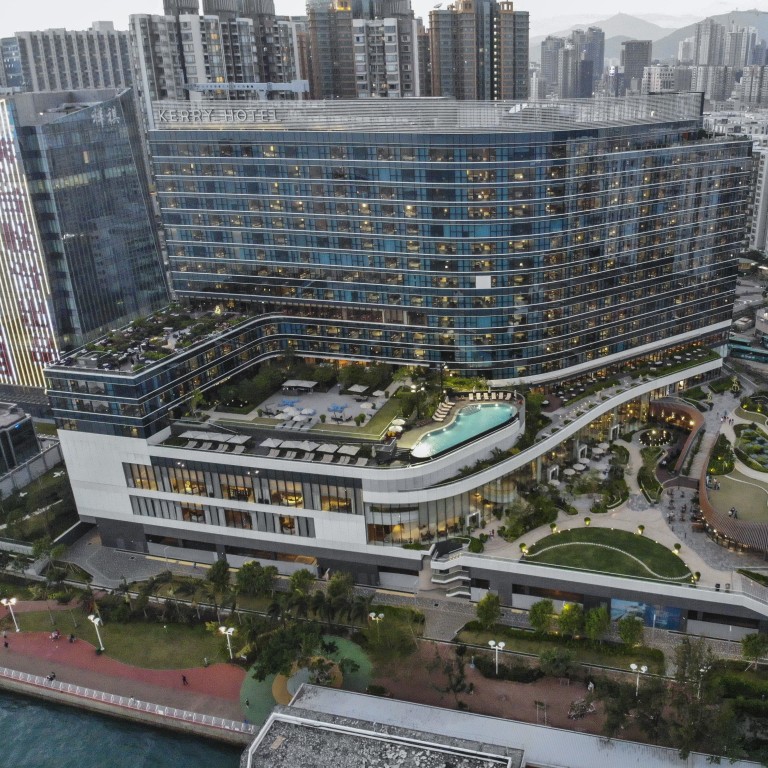
Hong Kong co-working operator theDesk, Kerry Hotel start profit-sharing venture to beat pandemic-driven slowdown
- theDesk is occupying 6,600 sq ft in Hung Hom hotel
- ‘We have adapted to cater to a new generation of needs,’ hotel’s general manager says
The coronavirus pandemic is forcing a hotel and a co-working space operators to collaborate in a whole new way, one that involves profit sharing instead of the traditional tenant-landlord relationship.
Hong Kong-based co-working company theDesk is now occupying 6,600 sq ft in the Hong Kong hotel group Shangri-La’s Kerry Hotel in the city’s Hung Hom district.
The model “allows us to have tighter collaboration and interest alignment with our partners”, Thomas Hui, theDesk’s chief executive and co-founder, said. “We share the business potential and risks.”
Hotels are among property segments worst-hit by the pandemic. At its peak in the first quarter, about 80 per cent of hotels in Asia-Pacific had to cease operations temporarily, according to property consultancy Colliers International. The segment’s losses have been pegged at US$50 billion by Colliers.
The co-working segment has been badly affected too – demand in Hong Kong is expected to decline as companies are forced to reassess the need for office space amid extended work from home arrangements, Colliers said.
WeWork dumps coworking space in breach of leases with major Hong Kong landlords
The arrangement between theDesk and Kerry Hotel will compensate the hotel as landlord and minimise risks for the co-working company.
“By integrating the co-working concept, we will be able to connect business travellers, entrepreneurs and local communities, which the service centre never could. We have adapted to cater to a new generation of needs,” said Andrew den Oudsten, the hotel’s general manager.
Partnerships between hotels and co-working operators represent a “natural” fit, said Corey Hamabata, senior vice-president, hotels and hospitality group, at JLL.
“Hotels are natural gathering places for people, and hotel lobbies have long been used as places for business travellers to work. Business centres in hotels are also a commonplace amenity,” he said, adding that expanding into co-working was a natural extension. Besides profit sharing or rental income, hotels can also attract co-working customers to their restaurants, spas and other amenities.
Coronavirus could be beginning of end for WeWork in Hong Kong
Other hotels that offer co-work spaces are AccorHotels, which has partnered with Wojo to host co-working spaces across all its brands worldwide; Soho House, with its Soho Works in London; The Hoxton, which has launched Working_From; and Marriott international, which has retrofitted lobbies at its hotels to allow for productivity tables, Govinda Singh, executive director, valuation and advisory services, at Colliers International, said.
“There might also be a possibility of transitioning rooms in low occupancy hotels into private offices, licences permitting,” said Jonathan Wright, director, flexible workspace consulting, at Colliers International.
Industrious, the largest premium workspace operator in the US, has partnered with boutique hotel Wythe Hotel in Brooklyn, New York to convert loft-style guest rooms into private office suites that can accommodate up to four people. As far as hotels go, guests have a lot more dwell time on the property with potential for spending, said Colliers International’s Singh, while co-working operators potentially have a captive market and higher usage.

04:33
Double punch for Hong Kong’s economy from coronavirus following months of civil unrest
But converting hotel rooms into offices will entail huge costs, among other limitations. “Since hotel rooms are generally built with a limited number of fixed square footage sizes, once converted, you will end up with a limited variety of offices sizes,” said Paul Salnikow, chairman and chief executive at The Executive Centre. “With the cost of build per hotel room being very high, a conversion is likely to occur only if the owner believes that the hotel will never reopen as a hotel.”

